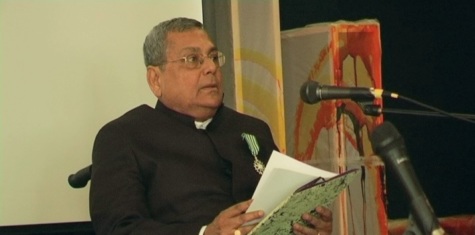From Calcutta to Paris: Prithwindra Mukherjee, the Multi-Dimensions Man
Living in the French capital for more than half a century, Prithwindra kept my attention both by his intellectual capacity, through his reflection on the Indian independence movement from which Gândhi originated, and by his musical and poetic sensitivity. In fact, in his youth, Prith set to music several Bengal poems and produced a Thousand Years Anthology of Bengali Poetry.
After I contacted him, Prithwindra – the Lord of the Earth in Sanskrit – agreed that Contrib’City would post a dialogue between the two of us. Because of the Coronavirus, we had to use modern communication tools. Despite these relational ersatz, we still managed to share our thoughts and our worldviews.
So, I would like to thank Prithwindra very much for the honor he gives not only to the Contrib’City site but also to all the readers of this testimony. Prith shares with us his view of our world with its medical suffering (Prithwindra suffered from polio), its wars or its conflicts. The latter, even liberating, are always atrocious: The fable that the non-violent program of Gândhî has earned India its independence – without ever having to shed a drop of blood – is far from reality [1]MUKHERJEE Prithwindra, Les racines intellectuelles du mouvement d’indépendance de l’Inde (The intellectual roots of the Indian independence movement) – (1893-1918) – Lecture. Prith also offers us the cultural riches of his country of origin and finally, last but not least, his philosophical and spiritual impulse drawn from the ashram (school) where his parents had put him. This school was founded by the independentist and poet Sri Aurobindo and his French companion, Blanche Rachel Mirra Alfassa, nicknamed The Mother, who was to found, in 1968, Auroville: an international pacifist community, north of Pondichery.
In 1966, when arriving alone at Orly (Paris Airport), with just the Divine Grace to support him, having said goodbye to his maternal India, a little like Jacques Brel’s lovers in his song[2]BREL Jacques, “Orly” in Les Marquises, Paris, Barclay, 1977. [Consulted on 4th May 2020], available at: https://www.youtube.com/watch?v=Lq5iD-xV9wI, he continued on his way. Now on French soil, he was going to [greet] every day a new experience that went in the direction of [his] quest. A road that would cross that of many intellectuals and artists such as the sociologists Raymond Aron and François Bourricauld, the historian Emmanuel Leroy-Ladurie, the composer Henri Dutilleux and the American singer Dawn Upshaw, the singers Georges Brassens (his neighbor in Paris) and the Belgian Jacques Brel, the director Nicolas Bataille, the economist Jacques Attali or even the Pope (and jurist) Paul VI.
What caught my attention at Prithwindra is its multi-dimensionality: a life that is both local (Calcutta, Pondichéry, Paris), continental (his travels in the Indian subcontinent) and finally global (Asia, Europe and America).
The historical dimension in Prith surprised me: through songs in Sanskrit (the mother of almost all European languages), then his learning from The Mother in the ashram, the revolutionary Indian poems and finally the twentieth century French writers.
But I believe that what moved me, in Prithwindra, beyond its multi-dimensionality, is its fidelity to what carries him deep inside, a force which sublimates its handicap, the geographic and historical distances, like the British scientist Stephen Hawking who was both paralytic and speaking about the cosmos. As Prith simply explains: There are no coincidences in life.
In the next few articles, dear Contrib’Citizen, you will be able to discover a little more about this force that has moved Prith along his way.
(Cover photo, 2009: Prithwindra is declared a French Knight in the Order of Arts and Letters. Courtesy of Prith).
Références

